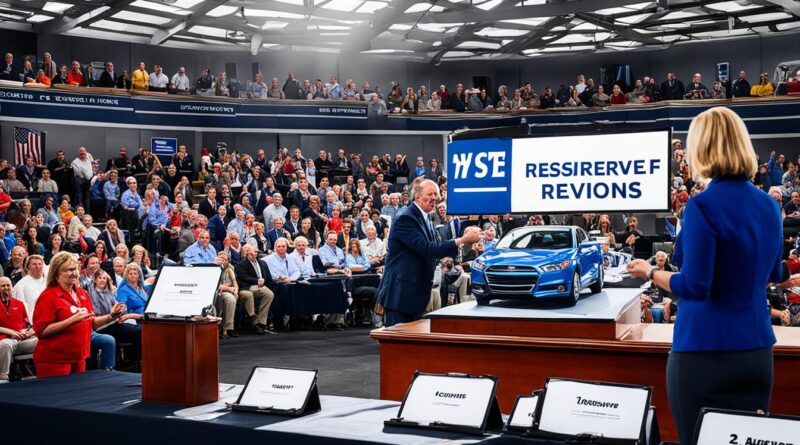What Does “Reserve Off” Mean at a Car Auction
As we navigate the dynamic world of car auctions, one term we often encounter is “reserve off.” This critical concept holds significant implications for both buyers and sellers, and understanding it can make all the difference in our bidding strategies and decision-making. In this section, we’ll explore the meaning of “reserve off” and how it can impact our car auction experiences.
When a car is listed as “reserve off” at an auction, it indicates that the seller has waived the minimum price they were willing to accept for the vehicle. This allows the car to be sold to the highest bidder, regardless of whether that bid meets the seller’s previously set reserve price. This open-ended approach to pricing can create exciting opportunities for savvy buyers, as it opens the door to potential bargains and deals that might not have been possible under a traditional reserve system.
By understanding the implications of “reserve off,” we can craft more effective bidding strategies and make informed decisions that align with our goals and budgets. Whether we’re seasoned car auction enthusiasts or newcomers to the scene, grasping the nuances of “reserve off” can be a game-changer in our pursuit of the perfect vehicle.
The Meaning of “Reserve Off” in Car Auctions
At a traditional car auction, the seller sets a reserve price, which is the minimum amount they are willing to accept for the vehicle. If the highest bid during the auction does not meet or exceed this reserve price, the car will not be sold. However, when a car is listed as “reserve off,” the seller has decided to forgo this minimum price requirement. This means the vehicle will be sold to the highest bidder, regardless of whether that bid meets the previous reserve price.
Understanding the Term and Its Implications
The phrase “reserve off” in car auctions refers to a scenario where the seller has chosen not to set a minimum acceptable price for the vehicle. This can create opportunities for buyers to potentially secure great deals, as the competition may be reduced with the absence of a reserve price. When a car is sold “reserve off,” the highest bidder will take possession of the vehicle, even if their offer falls below the seller’s original expectations.
The implications of a “reserve off” car auction can be significant for both buyers and sellers. Buyers may find that they can acquire vehicles at lower prices than they would have in a traditional auction setting, as the lack of a reserve price can lead to more competitive bidding. Sellers, on the other hand, risk not achieving the highest possible price for their vehicle, but they may prioritize a quick sale over maximizing their return.
Understanding the concept of “reserve off” is crucial for anyone interested in participating in car auctions. It can help buyers identify opportunities to find great deals, while sellers should carefully consider the potential trade-offs of forgoing a reserve price. By being informed about the nuances of “reserve off” auctions, buyers and sellers can make more informed decisions and potentially achieve their desired outcomes.

“The absence of a reserve price in a car auction can create a truly competitive environment, where the highest bidder takes the vehicle, regardless of whether their offer meets the seller’s initial expectations.”
What “Reserve Off” Mean Car Auction
When a car is offered at a “reserve off” auction, it signifies that the seller has decided to let the market determine the final sale price. They are willing to accept the highest bid, even if it falls below their previously set reserve price. This can be an attractive option for sellers who are eager to sell their vehicles quickly or who are confident that the competitive bidding environment will result in a favorable outcome.
For buyers, “reserve off” auctions can present an opportunity to secure a great deal. Since the seller has removed the predetermined minimum price, buyers no longer have to contend with a reserve that could potentially price them out of the market. Instead, they can participate in the bidding process and potentially purchase the vehicle at a price that is lower than the seller’s initial expectations.
Understanding the concept of “reserve off” in car auctions is crucial for both buyers and sellers. By recognizing the implications of this term, individuals can make informed decisions and potentially achieve their desired outcomes when participating in these types of auctions.
“The ‘reserve off’ feature allows us to let the market determine the final sale price, which can be beneficial for both buyers and sellers in the right circumstances.”
Navigating “Reserve Off” Auctions
When attending a “reserve off” car auction, buyers should be prepared to research the vehicles of interest thoroughly and set their maximum bid accordingly. Conversely, sellers should carefully consider their goals and the market conditions before opting for a “reserve off” auction, as the final sale price may be lower than their initial expectations.
By understanding the meaning of “reserve off” and how it affects the auction process, both buyers and sellers can make more informed decisions and potentially find success in these dynamic automotive marketplaces.
Advantages of Attending a “Reserve Off” Car Auction
Attending a “reserve off” car auction can offer numerous advantages for both buyers and sellers. As buyers, we can take advantage of the absence of a reserve price to secure great deals and bargains. Without the constraint of a predetermined minimum price, we may be able to place bids that are lower than what we would typically offer at a traditional auction. This can lead to significant savings, especially for those of us who are willing to do our research and identify vehicles that are priced below their true market value.
For sellers, “reserve off” auctions can provide a means to quickly liquidate their inventory, even if the final sale price may be lower than their initial expectations. This flexibility can be particularly beneficial for those looking to clear out their stock or make room for newer models. By attending a “reserve off” auction, sellers can potentially attract a wider pool of buyers and generate faster turnaround on their vehicles.
Potential for Great Deals and Bargains
One of the primary advantages of attending a “reserve off” car auction is the potential to find great deals and bargains. Without the reserve price, buyers have the opportunity to bid on vehicles at prices that may be significantly lower than their true market value. This can be especially advantageous for those who are willing to do their due diligence and research the vehicle’s history and condition before placing a bid.
By carefully evaluating the vehicles on offer and identifying those that are underpriced, buyers can potentially secure a remarkable deal. This can be an excellent opportunity for savvy buyers to add high-quality vehicles to their collection or fleet at a fraction of the typical cost.

“The absence of a reserve price at a ‘reserve off’ auction can open up a world of possibilities for buyers looking to find great deals on vehicles. It’s all about doing your homework and being willing to take a calculated risk.”
| Advantages of Attending a “Reserve Off” Car Auction | Benefits for Buyers | Benefits for Sellers |
|---|---|---|
| Potential for great deals and bargains | Opportunity to secure vehicles at lower prices | Ability to quickly liquidate inventory |
| No reserve price constraint | Flexibility to bid below market value | Attract a wider pool of buyers |
| Faster turnaround for sellers | Chance to add high-quality vehicles to collection | Generate faster turnover on vehicles |
Strategies for Successful Bidding at “Reserve Off” Auctions
Navigating the bidding process at a “reserve off” car auction requires a strategic approach. As buyers, we should thoroughly research the vehicles we’re interested in, closely monitoring market prices and trends to identify potential undervalued gems. This knowledge will be crucial in helping us determine the true worth of each car, allowing us to make informed decisions during the bidding process.
Additionally, it’s essential to set a maximum bid that aligns with our budget and our perceived value of the vehicle. The absence of a reserve price can sometimes lead to emotional or overzealous bidding, so maintaining discipline and staying focused on our target price range is key to securing valuable deals. By remaining level-headed and sticking to our predetermined limits, we can increase our chances of walking away with a great car at an unbeatable price.
Potential for Great Deals and Bargains
The “reserve off” nature of these auctions creates an exciting environment where buyers can potentially find exceptional bargains. By staying informed, setting realistic limits, and exercising restraint, we can navigate these auctions successfully and drive away with the car of our dreams at a fraction of the cost. With the right strategies in place, the “reserve off” format can be a goldmine for savvy buyers seeking unbeatable deals.

